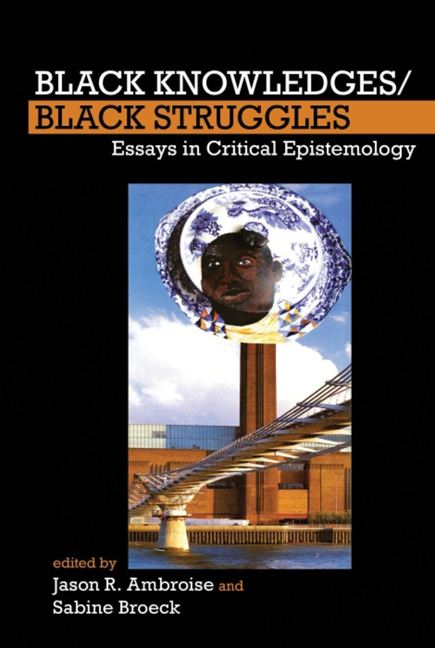Book contents
- Frontmatter
- Contents
- List of Figures
- List of Contributors
- 1 Black Knowledges/Black Struggles: An Introduction
- 2 “Come on Kid, Let's Go Get the Thing”: The Sociogenic Principle and the Being of Being Black/Human
- 3 Respectability and Representation: Black Freemasonry, Race, and Early Free Black Leadership
- 4 Ethno-Class Man and the Inscription of “the Criminal”: On the Formation of Criminology in the USA
- 5 Dehumanization, the Symbolic Gaze, and the Production of Biomedical Knowledge
- 6 Performing Scientificity: Race, Science, and Politics in the USA and Germany after the Second World War
- 7 Imaginary Black Topographies: What are Monuments For?
- 8 The Ceremony Found: Towards the Autopoetic Turn/Overturn, its Autonomy of Human Agency and Extraterritoriality of (Self-)Cognition
- Works Cited
- Index
2 - “Come on Kid, Let's Go Get the Thing”: The Sociogenic Principle and the Being of Being Black/Human
- Frontmatter
- Contents
- List of Figures
- List of Contributors
- 1 Black Knowledges/Black Struggles: An Introduction
- 2 “Come on Kid, Let's Go Get the Thing”: The Sociogenic Principle and the Being of Being Black/Human
- 3 Respectability and Representation: Black Freemasonry, Race, and Early Free Black Leadership
- 4 Ethno-Class Man and the Inscription of “the Criminal”: On the Formation of Criminology in the USA
- 5 Dehumanization, the Symbolic Gaze, and the Production of Biomedical Knowledge
- 6 Performing Scientificity: Race, Science, and Politics in the USA and Germany after the Second World War
- 7 Imaginary Black Topographies: What are Monuments For?
- 8 The Ceremony Found: Towards the Autopoetic Turn/Overturn, its Autonomy of Human Agency and Extraterritoriality of (Self-)Cognition
- Works Cited
- Index
Summary
If she was cute – and if anything could be believed, she was – then we were not. And what did that mean? We were lesser. Nicer, brighter, but still lesser. Dolls we could destroy, but we could not destroy the honey voices of parents and aunts, the obedience in the eyes of our peers, the slippery light in the eyes of our teachers when they encountered the Maureen Peals of the world. What was the secret? What did we lack? Why was it important? […] And all the time we knew that Maureen Peal was not the Enemy and not worthy of such intense hatred. The Thing to fear was the Thing that made her beautiful, and not us.
Toni Morrison, The Bluest Eye (1970): 74We have no philosophers who have dealt with these and other problems from the standpoint of the Negro's unique experience in this world. […] They have failed to study the problems of Negro life in America in a manner which would place the fate of the Negro in the broad framework of man's experience in this world.
E. Franklin Frazier, “The Failure of the Negro Intellectual” (1973): 60In its March 1928 edition, The Crisis published a letter written by a very enterprising South Bend, Indiana high school sophomore, Roland A. Barton. Barton felt compelled to write because he disagreed with the journal's use of the term “Negro.” He questioned why the official organ of the NAACP would “designate, and segregate us as ‘Negroes,’ and not as ‘Americans’.” He was also opposed to the use of such a term for “the natives of Africa” whom he felt should be called Africans or “natives.” According to Barton, “the word, ‘Negro,’ or ‘nigger,’ is a white man's word to make us feel inferior.” Therefore, as a young “worker for the race,” he hoped that in the future this term would no longer be used to refer to those of African hereditary descent (Barton, 1928: 96).
Barton's inquisitive letter emerged in a critical moment in the trajectory of the ongoing question posed by those of African hereditary descent, the population who owed its group presence in the Americas to the massive transshipment of the Middle Passage.
- Type
- Chapter
- Information
- Black Knowledges/Black StrugglesEssays in Critical Epistemology, pp. 21 - 43Publisher: Liverpool University PressPrint publication year: 2015



